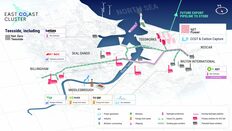- Contracts awarded for dual Front End Engineering Design (FEED) competition.
- Final Investment Decision expected in 2023.
- East Coast Cluster aims to store up to 27 million tonnes of CO2 annually by 2035.
- NZT Power to provide low carbon electricity for up to 1.3 million homes.

Project Overview
bp and its partners have awarded contracts for the Front End Engineering Design (FEED) phase of the Net Zero Teesside Power (NZT Power) and Northern Endurance Partnership (NEP) projects. These contracts are part of a competition involving two consortiums to develop the UK's first full-scale integrated power and carbon capture project.
Selected Consortiums
The two selected consortiums are Technip Energies and General Electric, and Aker Solutions, Doosan Babcock, and Siemens Energy. Each will deliver a comprehensive FEED package over the next 12 months, after which they will submit Engineering, Procurement, and Construction (EPC) proposals. A single consortium will be chosen for the construction phase in 2023.
Government and Industry Support
The UK government has identified the Northern Endurance Partnership’s East Coast Cluster as a key part of its carbon capture and storage (CCUS) strategy. The cluster aims to transport and store CO2 emissions from the Humber and Teesside regions, with the potential to handle up to 27 million tonnes of CO2 annually by 2035.
Project Impact
NZT Power, a joint venture between bp and Equinor, will be a gas-fired power station integrated with carbon capture technology. It is expected to provide low carbon electricity for up to 1.3 million homes, supporting the UK's goal to decarbonize its power system by 2035. The project will also support the deployment of renewable energy by providing flexible, dispatchable low carbon electricity.
Economic and Employment Benefits
The East Coast Cluster is projected to create and support an average of 25,000 jobs annually until 2050, with a peak of approximately 41,000 jobs in 2026. This initiative is crucial for the economic growth and industrial decarbonization of the Teesside and Humber regions.

